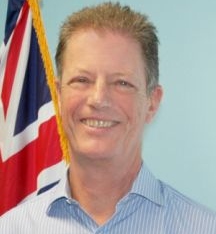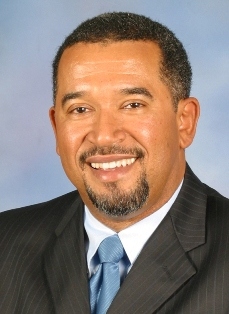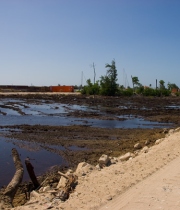Archive for July 16th, 2010

Mangroves disappearing faster than land-based forests
 (CNN): The destruction of the world’s mangrove forests is happening up to four times faster than the world’s land-based forests, according to a new report. A study commissioned by the ITTO (International Tropical Timber Organization) reports that one fifth (around 35,500 square kilometers) of the world’s mangroves — forests straddling both land and sea — have been lost since 1980. Although the study reports that annual destruction has slowed to 0.7 percent a year, the authors of the "World Atlas of Mangroves" report warn that continued coastal destruction and shrimp farming could cause financial and ecologic havoc. Studies estimate mangroves generate between US$2000 to $9000 per hectare annually from fishing. (Photo by Dennie Warren Jr)
(CNN): The destruction of the world’s mangrove forests is happening up to four times faster than the world’s land-based forests, according to a new report. A study commissioned by the ITTO (International Tropical Timber Organization) reports that one fifth (around 35,500 square kilometers) of the world’s mangroves — forests straddling both land and sea — have been lost since 1980. Although the study reports that annual destruction has slowed to 0.7 percent a year, the authors of the "World Atlas of Mangroves" report warn that continued coastal destruction and shrimp farming could cause financial and ecologic havoc. Studies estimate mangroves generate between US$2000 to $9000 per hectare annually from fishing. (Photo by Dennie Warren Jr)
CNS note: The report was a joint initiative of ITTO (funding agency), ISME (International Society for Mangrove Ecosystems, the implementing agency), FAO, UNEP-WCMC, UNESCO-MAB, UNU-INWEH, and TNC. The authors are Mark Spalding (lead author), Mami Kainuma and Lorna Collins with map preparation lead by FAO and UNEP-WCMC. The project received majority funding from ITTO through a Japanese Government grant.

HRC queries jury removal
 (CNS): Following the recent revelations that the government proposes to remove the right to trial by jury for all firearms related offences, the Human Rights Commission has also sent its concerns to the Attorney General’s Office. In a letter, which is available on the commission’s new website, the HRC writes that the jury trial is a fundamental right. Richard Coles, chair of the commission, further points out that as the law will make the judge alone trial mandatory in these cases, the prosecution will be under no obligation to demonstrate the danger of jury tampering. He also noted that when these trials were introduced in Northern Ireland they were severely criticised.
(CNS): Following the recent revelations that the government proposes to remove the right to trial by jury for all firearms related offences, the Human Rights Commission has also sent its concerns to the Attorney General’s Office. In a letter, which is available on the commission’s new website, the HRC writes that the jury trial is a fundamental right. Richard Coles, chair of the commission, further points out that as the law will make the judge alone trial mandatory in these cases, the prosecution will be under no obligation to demonstrate the danger of jury tampering. He also noted that when these trials were introduced in Northern Ireland they were severely criticised.
“The total power and authority of the judge alone to make decisions on the case at hand where the defendant has not chosen to be tried this way may raised questions regarding the individual’s right to a fair trial,” Coles, a former attorney general, wrote in the letter to the AG.
The HRC chair does not entirely condemn a move that has raised significant concerns throughout the legal community and those concerned about the gradual erosion of civil rights. Coles says there is an element of proportionality in the changes to the law provided assurances can be given of the judge’s discretion to minimise the potential for a breach of human rights.
However, the chair reminds the attorney general that the imposition of judge alone trials in other places raised significant concerns about human rights. “Where ‘judge alone’ trials have taken place in the past, in other jurisdictions (e.g. Northern Ireland) their use was severely criticised,” Coles wrote.
The full letter can be seen on the HRC’s newly launched website, which, the chair says, marks a step forward in the Commission’s work. “While fulfilling our public education mandate, the launch also provides a primary avenue to stay connected with the public," he said.
Although the Bill of Rights does not come into force until 2012, the commission is still tasked with advising government on new and amended legislation to ensure the country’s laws do not breach human rights.
The website also offers access to the commission‘s policies and procedures, minutes of its meetings, responses to public and media enquiries and copies of correspondence with government officials. It also explains the different types of human rights infringements, complaints and breaches that will be heard by the HRC, as well as procedures for filing such complaints. In future, the HRC will regularly update the website to expand its educational material and a major focus will be an interactive educational section intended for youngsters.
"We hope that the website will become a major source for learning about the Commission and the Bill of Rights and we will appreciate feedback on the content," Coles added.

‘Career camp’ offers behaviour lessons
 (CNS): Teenagers were given the opportunity this week to help prepare them for their future vocations, thanks in part to the support of the Rotary Club of Grand Cayman Sunrise. Youth Vocational Camp, also known as "Career Camp", presented at the University College of the Cayman Islands, is focussed not so much on how to get a job but on how to behave in the working world. The campers were exposed to four distinct sections of camp: Fashion Design, Multimedia and Broadcasting, Office Procedures and Interviews.
(CNS): Teenagers were given the opportunity this week to help prepare them for their future vocations, thanks in part to the support of the Rotary Club of Grand Cayman Sunrise. Youth Vocational Camp, also known as "Career Camp", presented at the University College of the Cayman Islands, is focussed not so much on how to get a job but on how to behave in the working world. The campers were exposed to four distinct sections of camp: Fashion Design, Multimedia and Broadcasting, Office Procedures and Interviews.
James "Jamo" Myles, the Youth Services Coordinator who is responsible for Career Camp, said that each day they were given a brief presentation from visiting professionals in the teaching, legal, hospitality and human resource management professions, according to a Rotary release.
The government’s Youth Services Unit ran the camp because the teens are on the verge of choosing subjects for their external examinations, and the sooner young people focus on a career, the better their choices of subjects will be as they make their high school class selections.
Rotary Sunrise President Michael Levitt sums up his club’s determination to help the Youth Services Unit in its efforts. "When I assumed my position as President of Rotary Sunrise, I committed my year to the Youth of the Cayman Islands. By supporting this Career Camp, it is the beginning of how we are assisting with empowering and preparing the youth of these beautiful islands for a future that is full of hope and bright with promise."
The government’s Sizzling Summer Series Camps is for youths from ages 12 to 18. It is part of the Youth Services Unit’s effort to implement the National Youth Policy through the empowerment of young people.
The career camp is going on this week at UCCI in the G Block, next to the Library building. Teens can still sign up for next week’s Wellness Camp for a fee of $50. Interested people can call Jamo Myles at 943-1127 or 927-3372.
Photo by J.D. Mosley-Matchett: (left to right) Rotary Sunrise President Michael Levitt, James Myles of the Youth Services Unit, and Sunrise Youth Director Frank Balderamos.

Little Cayman restaurant offers sustainable eating
 (CNS): When it comes to protection of the marine environment, the choices people make about what seafood they eat are very important, and with Little Cayman Beach Resort becoming the latest restaurant to join the National Trust’s Cayman Sea Sense (CSS) there is one more place where people can help. The Cayman Sea Sense project is a local sustainable seafood education programme dedicated to helping restaurants and their customers make environmentally positive seafood choices. The project assists chefs and restaurant owners to reduce the number of non-sustainable seafood items on their menus.
(CNS): When it comes to protection of the marine environment, the choices people make about what seafood they eat are very important, and with Little Cayman Beach Resort becoming the latest restaurant to join the National Trust’s Cayman Sea Sense (CSS) there is one more place where people can help. The Cayman Sea Sense project is a local sustainable seafood education programme dedicated to helping restaurants and their customers make environmentally positive seafood choices. The project assists chefs and restaurant owners to reduce the number of non-sustainable seafood items on their menus.
Catherine Childs and Sharon Adam-Whitmore, the new directors of CSS, said they were delighted to welcome Little Cayman Beach Resort to the list of those restaurants already making good choices about what seafood they serve.
“As the new directors of CSS, we have been encouraged by the support of CITA and the National Trust; we have also created a page on Facebook whose 58 members are committed to education and conservation,” they said. “CSS empowers more diners to confidently identify and choose restaurants that provide environmentally responsible seafood menu items, and provide restaurants with the information and support to continuously improve menus from an environmental sustainability perspective.”
In order to be eligible to carry the Sea Sense logo, restaurants and staff must make a commitment to provide at least one sustainable option on their menu with a commitment for continuous improvement. Full certification comes when all seafood items on the menu are sustainable. For more information about CSS, including how to join or become a volunteer, you can email Catherine or Sharon at caymanseasense@gmail.com or visit the CSS Facebook page.
For a list of participating restaurants, visit the National Trust website.

National Trust scores big in HSBC Golf Tournament
 (CNS): The first HSBC Golf Tournament raised $26,000 in total for the National Trust for the Cayman Islands through sponsorship from HSBC, team registration, hole sponsorship and putting contest. CEO of HSBC Bank (Cayman) Limited, Gonzalo Jalles, also surprised the National Trust with an additional $10,000 cheque at the end of the day’s festivities. Eighty golfers participated in the half day tournament, which was hosted by HSBC Bank (Cayman) in partnership with the National Trust on Friday, 9 July, at the North Sound Club golf course, and played in a range of contests, including five closest to the pin, closest to the rope, the chance to win a Mercedes-Benz from Auto Haus and a putting contest.
(CNS): The first HSBC Golf Tournament raised $26,000 in total for the National Trust for the Cayman Islands through sponsorship from HSBC, team registration, hole sponsorship and putting contest. CEO of HSBC Bank (Cayman) Limited, Gonzalo Jalles, also surprised the National Trust with an additional $10,000 cheque at the end of the day’s festivities. Eighty golfers participated in the half day tournament, which was hosted by HSBC Bank (Cayman) in partnership with the National Trust on Friday, 9 July, at the North Sound Club golf course, and played in a range of contests, including five closest to the pin, closest to the rope, the chance to win a Mercedes-Benz from Auto Haus and a putting contest.
The top three teams received one-of-a-kind glass-blown figurines from The Island Glassblowing Studio. The winning team Genesis Trust (Colin MacKay, Nick Rogers, Mike McDonald and Roger Prialux) each received glass-blown blue iguanas and vouchers to participate in a Blue Iguana Safari at the Blue Iguana Recovery Program located in the Queen Elizabeth II Botanic Park. Runners-up SRS Cayman Ltd (Seamus Tivnan, Daniel Maclean, Ron Sulisz, Peter MacKay) were each awarded green parrots and a voucher to go on a Birding Tour on the Mastic Trail, while third place team KPMG (Joel Dodson, Greg Bennet, Colin Nicklson and James Walton) received sea turtles and vouchers for to go on a guided Historic Walking Tour of George Town. The players of Team Spectrum Global Fund Administration (Cayman) the last place team, received two rounds of golf for four from the North Sound Club Golf Course and The Britannia Golf Course.
Contest prizes were donated by Auto Haus, The Ritz-Carlton, Grand Cayman, Cayman Luxury Charters, Audi, Michael’s Genuine Food and Drink, The Lobster Pot, Agave Food and Drink Jacques Scott Ltd., Seven Fathoms,The North Sound Club, The Britannia Golf Course.
“We are extremely grateful to everyone who participated in the tournament, our hole sponsors, our prize donors, the North Sound Club, Welly’s Cool spot for providing the buffet dinner and the glassblowing studio for the wonderful team prizes,” said Frank Bladeramos, General Manager of the National Trust for the Cayman Islands. “The National Trust would especially like to express appreciation to the team at HSBC and their support throughout the event. Without you the tournament would not have been able to happen. We hope to see everyone next year for a bigger golf tournament!”
Photo: Frank Balderamos, General Manager of the National Trust (left) receives and unexpected donation cheque from Gonzalo Jalles, CEO of HSBC Bank (Cayman) Limited.

NIC on the hunt for new investors
 (CNS): The recently formed National Investment Council (NIC) said this week that it has now met the people involved with more than a dozen new projects, ranging from tourism products and fund administration to the information technology arena, and evaluated those projects. NIC Chairman William Peguero said the council’s goal was to co-ordinate Cayman’s various business sectors and government policies to encourage new investment. He said the NIC was exploring viable strategies to stimulate and grow Cayman’s economy to generate new forms of revenue.
(CNS): The recently formed National Investment Council (NIC) said this week that it has now met the people involved with more than a dozen new projects, ranging from tourism products and fund administration to the information technology arena, and evaluated those projects. NIC Chairman William Peguero said the council’s goal was to co-ordinate Cayman’s various business sectors and government policies to encourage new investment. He said the NIC was exploring viable strategies to stimulate and grow Cayman’s economy to generate new forms of revenue.
“All business sectors are interconnected and there has to be a collaborative effort between the macroeconomic policies that are being developed by the government and the policies and procedures implemented by business agencies,” Peguero said. “The goal of the NIC is to align both public and private sector demands to open the doors for increased revenue to the islands.”
Transparency in investment policies, efficiency in investor facilitation and improvement in the investor approvals process is essential to boosting confidence in the jurisdiction, the council believes. It aims to meet those needs by facilitating the formulation of policy guidelines on foreign investment in all sectors of the economy, reviewing applications submitted by investors, providing recommendations to investors, monitoring application progress, providing assistance with resolving problems pertaining to investment projects and establishing procedures to ensure effective coordination between the relevant government agencies and boards, a statement from the council revealed.
It did not say, however, how close the council was to recruiting any new investors to the islands or to the implementation of any specific private sectors projects that would generate new cash for government coffers.
The statement said that since the council’s formation at the start of this year, members have aggressively been evaluating measures to generate new forms of revenue and have actively been strategizing on ways to draw new commerce and investment to the country.
“We are positive that our collaborative approach and support of both the private and public services will help us meet pressing demands and set a strong economic foundation that will position Cayman for economic success into the future,” Peguero added.
The NIC is an integrated body of key business leaders designed to bridge the gap across Cayman’s various business sectors. Intended to gather input and recommendations from different organisations, boards and committees its goal is to create an economic blueprint to move Cayman forward.
The council members are James Bergstrom, Michael Ryan, Burns Conolly, Marcus Cumber, Jim O’Neill and Dax Basdeo and reports to a special Cabinet Committee, chaired by Premier McKeeva Bush and supported by the Investment Advisory Committee (IAC), which consists of senior civil servants across immigration, planning, environment, employment relations, customs, tourism, financial services and agriculture.

Dragon Bay canals too deep
 (CNS): Following revelations that the developer of the Ritz-Carlton was given planning permission to remove a 300 foot mangrove buffer zone on the Dragon Bay development site recently, an FOI request by a member of the public has now revealed that he has also been given planning permission for dangerously deep canals. The documentation reveals that the Central Planning Authority (CPA) gave the Dragon Bay developer permission to excavate a canal system as deep as 20 feet while remaining connected to the North Sound. The depth is more than double the maximum recommended and is described by the Department of Environment as a “dangerous precedent” with far reaching environmental consequences. (Photo by Dennie Warren Jr)
(CNS): Following revelations that the developer of the Ritz-Carlton was given planning permission to remove a 300 foot mangrove buffer zone on the Dragon Bay development site recently, an FOI request by a member of the public has now revealed that he has also been given planning permission for dangerously deep canals. The documentation reveals that the Central Planning Authority (CPA) gave the Dragon Bay developer permission to excavate a canal system as deep as 20 feet while remaining connected to the North Sound. The depth is more than double the maximum recommended and is described by the Department of Environment as a “dangerous precedent” with far reaching environmental consequences. (Photo by Dennie Warren Jr)
In a letter to the CPA chair written in November last year in the wake of the authority’s decision, the DoE Director Gina Ebanks-Petrie points out that it was a serious step backward in environmental considerations with respect to canals. “We believe this decision to be short sighted and one which will set a dangerous precedent with far reaching repercussions for the natural environment of the Cayman Islands,” Ebanks-Petrie wrote.
The director pointed out the copious research which revealed that canals dug beyond 9 feet, as recommend by the Wickstead Report as far back as 1976, showed serious environmental problems, from negative impacts on water quality to the reduction of biodiversity. Local recommendations on canal depths are based on efforts to safeguard water quality and the marine life that they would be connected to. The director pointed out to the planning chair that they were based on sound and rigorous scientific research. In the US more recent research indicates that canal systems should be limited to six feet.
The letter also noted that with years of canal development in the North Sound area there was an even greater need to restrict depths than ever before rather than extending them the as the CPA had done with the Dragon Bay development. The director requested an opportunity to talk to the CPA about the decision and present them the full details of why the decision was dangerously detrimental, which the CPA accepted. Despite the case made by the DoE, however, the planning permission was not reversed and developer still has permission to dig the dangerously deep canals.
According to the FOI documents, which were released by the Water Authority, the Aggregate Advisory Committee also wrote to the CPA pointing out that research regarding excavation pits had indicated they should never be connected to the sea and it said the aggregate policy was never intended to promote any kind of canal excavation beyond 14 feet that would be connected to the sea.
Scott Slaybaugh, chair of the committee and the author of the letter, wrote that connecting anything deeper than that to the sea would have “devastating impacts on marine natural resources”. He pointed out that the AAC was also guided by the 9 foot limit in the Wickstead Report when it cameto canals. Slaybaugh pointed out that research undertaken by the committee regarding inland excavation of 20 feet that would impact ponds revealed significant noxious odours and damage to the pond and surrounding areas, which might be an acceptable risk if the pond was not connected to the sea. “On the other hand, poor water quality in a pond connected to the sea has a much broader and unacceptable risk.”
The person who requested the information told CNS that he is still waiting for correspondence regarding this planning permission from the CPA.
Document released under FOI:
WA policy for excavations – final November 2002
CPA policy clarification on depth of excavation
DoE letter to CPA re Dragon Bay 18 Nov 2009
Register of Canal Works Permits – June 2010

Mac introduces PADs
 (CNS): Although the passing of the amendments to the Development and Planning Law and the new regulations have caused some controversy, government, opposition and the independent member agree that a lot of the law is positive and will modernise the country’s future development, remove red tape and improve enforcement of regulations. It also introduces a new type of development that government says will facilitate modern, mixed use, urban projects. Delivering the amendments in the Legislative Assembly last week, the premier, who has responsibility for development and planning, announced the creation of planned area developments, or PADs, under section 6 of the law. (Photo by Dennie Warren JR)
(CNS): Although the passing of the amendments to the Development and Planning Law and the new regulations have caused some controversy, government, opposition and the independent member agree that a lot of the law is positive and will modernise the country’s future development, remove red tape and improve enforcement of regulations. It also introduces a new type of development that government says will facilitate modern, mixed use, urban projects. Delivering the amendments in the Legislative Assembly last week, the premier, who has responsibility for development and planning, announced the creation of planned area developments, or PADs, under section 6 of the law. (Photo by Dennie Warren JR)
“My government’s amendments to the law will enable and facilitate public-private fostering of worldwide trends in planning and urban design and to allow the proper regulation of the larger developments,” Bush explained. “Planned Area Developments, PADs, are larger master-planned, mixed use developments with a minimum of 40 acres of land and at least three different land uses that, subject to regulations regarding application requirements, will help ensure that large developments employ sound principles of effective and efficient land-use planning.”
The goal, the premier said, was to ensure that the larger developments become more transparent to the Central Planning Authority and the country and that they are developed in such a way to minimize their impacts on the surrounding infrastructure and neighbours. “PADs legislation is now needed to deal with the larger, mixed use developments that we are seeing coming to our islands,” Bush stated.
Planned area developments, also referred to in some jurisdictions as ‘planned unit developments’, have been proposed by the Planning Department for many years, and Bush said he was proud to have finally brought this concept to the House for inclusion in the planning regulations. “Many countries have moved to allow planned area developments, which provide a more completely designed and sustainable style of development,” the country’s premier told the Legislative Assembly.
Bush said these developments would be required to cover a minimum 40 acres of land or a group of contiguous parcels, have three different land uses proposed for close interaction, provision of up to 5 percent land for open space to serve the development, an internal circulation network that minimizes conflicts with existing public roads, and have the necessary infrastructure and services that will minimize the impact on the islands’ existing infrastructure.
PADS are also restricted from being dangerous, obnoxious, toxic or cause offensive odours or conditions or create a nuisance or annoyance to adjacent properties, as well as complying with all applicable regulations regarding fire, health and public safety. The premier said they will be permitted in all areas, except industrial, public open space and mangrove buffer zones.
Developers of PADs will be required to submit a ‘development statement’ to set out to the CPA the development parameters, including appropriate plans to explain the proposed development and its overall design, infrastructure impact, proposed land use, covering everything from parking lots and street furniture to sewage disposal systems and telecommunication facilities, as well as the timeframe for the project.
This will ensure that future PADS will be more transparent to the wider public from inception and the developments will be monitored in accordance with their submitted statements.
“If the CPA approves a planned area development, the authority shall require a copy of the approved master plan, together with the approved planning statement, to be lodged with the director of planning, who shall keep a register of all approved planned area developments,” Bush said.
The premier revealed that the fee for such developments would be $500 per acre, but this would be merely for the review of the PAD application. He said regular planning, building control and infrastructure fees would still apply on application for specific buildings within the planned area development.